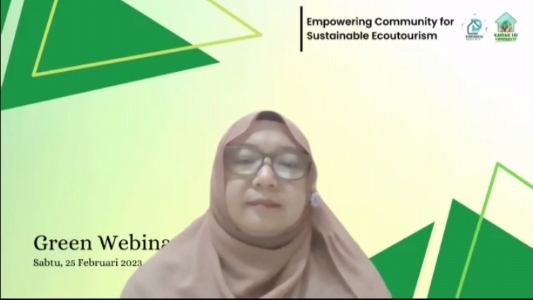Dr Meti Ekayani: Low Carbon Tourism Helps Drive Reduction of Carbon Emissions

Ecotourism is a form of eco-based and sustainable tourism. It contains three pillars namely economic, ecological, and social sustainability. The development of ecotourism, especially low-carbon tourism, has the potential to drive global emission reduction targets.
Dr Meti Ekayani, Lecturer at IPB University from the Department of Economics and Environmental Resources (ESL) Faculty of Economics and Management (FEM) explained that ecotourism should be sustainable. This tourism certainly does not have to be nature-based, but prioritizes increasing the awareness of related parties, for example, tour operators and tourists, as well as providing benefits to the community.
"During the COVID-19 pandemic, the tourism sector was a slumping sector, so tourism or ecotourism in rural areas should only be used as added value. The main income relies on local potentials such as agriculture or fisheries," she explained in the Green Webinar Series with the theme 'Empowering Community for Sustainable Ecotourism' by Kamar Ijo Community and Danau Biru Community (25/2).
According to him, after COVID-19 there was also a major visible impact on ecotourism. Such an explosion of visitors that most operators are overwhelmed.
"This incident is closely related to increasing carbon emissions, so there must be efforts to develop sustainable tourism which ultimately supports sustainable development," she added.
She added this low-carbon tourism potential can be developed and linked to mitigation and adaptation to climate change. Especially in various low-carbon tourism activities, ranging from transportation, and lodging, to waste management involving tour providers and tourists.
“Tourist activities and attractions are conceptualized as an effort to reduce carbon emissions and help improve the environment. This tourism activity involves environmental improvement actions to restore environmental functions such as planting mangroves or trees as attractive tourist attractions," she continued.
All aspects related to tourism must be low carbon, she continued, starting from attractions, accommodation, consumption, and transportation, to promotion must be comprehensive and low carbon.
According to him, the community and village communities around this tourist location must also play a role and adopt an environmentally friendly lifestyle. Of course, efforts to develop low-carbon tourism will not be successful without being accompanied by changes in the behavior of the people around the tourist sites.
"The ongoing ecotourism development can be directed as low-carbon tourism, but it needs to be monitored and evaluated and given a certification from a certification body. The results of the low-carbon tourism business can also be entered into the domestic carbon market," she concluded. (MW/Zul)(IAAS/TNY)



